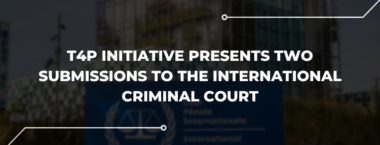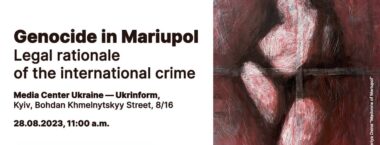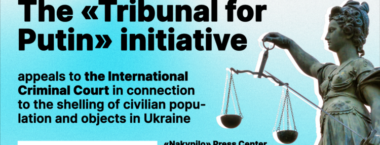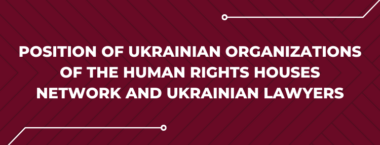
Torments, Torture Chambers, Executions: T4P Initiative Presents Two Submissions to the International Criminal Court
Information about extrajudicial executions of Ukrainians by the Russian military and Russian torture chambers in...
28 September 2023
Interview by Taras Viychuk
– I am 42 years old. I live and work in Kharkiv as a nurse in a city polyclinic. Since 4 a.m. on February 24, shells have been flying from the russian side all the time. Schools and stores have closed. There was nowhere to buy food. We had to make do with home supplies. A few days later, bread appeared and people tried to open at least grocery stores.
The price at the beginning was insane, from 37 UAH, but there was no choice. Then people tried to get the flour to bake something. Accordingly, yeast disappeared from the stores. Then there was food in the stores, but you had to stand in line for an hour and a half in the cold. That is why you had to buy not perishable food. All the more reason why there were no meat, only canned food, bread, and pasta. Cheap instant vermicelli “Miwina” was popular. No one knew whether he would make it through the evening.
Children couldn’t sleep during shelling. The shooting was going on, from four to ten in the morning. Then there was a short break and in the evening shooting started again at seven o’clock.
Heavy shelling was from 11 pm to 3 am. My children and I did not sleep well, because we were trying to protect ourselves. I start telling them: “If I cover you with my body, then…” It seems like time has passed, and I can’t calm down from the experience.
– Where did you hide during the shelling?
– There aren’t many bomb shelters in the city. The shelter was the subway, a 15-20 minute trolley bus ride away.
For the first day or two of the war, streetcars, and trolleybuses ran. Then everything stopped because the Russians started bombing, including infrastructure: kindergartens, schools, child and adult clinics, etc. It was impossible to hide somewhere or leave or get help.
In the polyclinic where I worked, only the doctors on duty left. During the siren, they went down to the basement. As far as possible only the surgeon on duty, the therapist, and the dentist-surgeon were sitting because nobody was talking about dental treatment. People tried to survive as best they could.
These therapists are still working online. Giving consultations over the phone, even if they are out of town because a lot of people have left. It’s like the polyclinic is closed, but if you need help, you can get basic help, so you don’t have to go to a hospital.
— What do you know about the destruction of Kharkiv and it’s suburbs?
— Near where I live there is a big medical center that includes a prenatal center, known to everyone in Kharkiv, and next to it is a big maternity home, a five-story building that provides a wide variety of services to expectant mothers, mothers that experience complications of pregnancy. Further behind it, is the building holding trauma unit, orthopedic center and surgery unit, meaning that people were receiving help there, if someone had spine problems, or had a surgical intervention or needed firs aid after injury. Further, the next building had medical and neurology departments.
If you drive to Kharkiv on Saltivka highway you can see them, big buildings where people are receiving help to this day. But what Russia does oversteps all boundaries, because the trauma unit, the building that was just renovated, had new windows installed, they have shot it up. There were plans to modernize the building, to weatherproof it. Everything was fixed up, and now we have to fix it up again somehow, because it all was destroyed, ruined.
I get the feeling that’s they were bombing civilians all the time and not military targets. How did we personally wrong them, that they were shelling kindergartens? Not far from us there is a school, it was bombed, half of it ruined. Few teachers have died because they were there, some keeping watch, others providing help. The school my kid goes to is still standing, thank God. They try to give out lunches there, some elderly people can’t leave and have to stay in Kharkiv, it’s a way to help them.
Villages outside of Kharkiv were occupied in an instant, in the first day, immediately tanks have cut off power lines and here, as a rule, heat supply system, heat and water supply are powered by electricity. So people were left without heating, and if they didn’t manage to flush the water in radiators it froze there.
My friend lives in Vilkhivka village. What happened there was pure horror. They have run over power lines and disrupted gas pipe, and when our guys, repairmen, went there, but they weren’t allowed to come near. They’ve planted mines on the fields around Vilkhivka, so our people couldn’t get there or would have to go through the fields contaminated by mines.
– Have your children suffered psychological traumas from the war?
– Of course, they are and will be, and it is unknown what will happen next. I think we will need to work with psychologists. The children went to the window and began to look: “Mom, look, there is smoke, there is something burning.” We saw a plane crash when ours (Ukrainian armed forces) shot down a plane, and it seemed to be flying straight at you, although it was quite far from us, it wasn’t even 300 meters, it was far, it was a different area, but it seemed that’s all, that’s all happening in front of your eyes. To this day they go to watch, and if there is an air alarm, they look out the window, we keep shouting: “Get away from the windows” – to this day. We close all the curtains at 8 o’clock in the evening, close everything, turn off the lights, we are still afraid of everything, and when we read the news, constantly watch the news and read what happened in Lviv, we immediately start shaking, we don’t understand what will happen here in an hour or two.
– Has the war changed your attitude towards the Russians?
– All those who live there watch the propaganda so much that, you know, it doesn’t fit in my head. I saw one reportage, and I do not understand: are they crazy? It seems that people get up in the morning, feed them some pills that make them zombies, because propaganda is Putin’s face, it’s hard for him, he decides: “We will all live badly, and then – better.” Why “bad” who asked you to come here, we did not ask you to come to us, we did not ask you for anything, we did not take anything from you and you do not owe anything. I have no idea how you can communicate with these people, people we live next door. I would probably build a fence like it was in Germany (Berlin Wall – translator’s note), to never see or hear them. At the same time, all our relatives who remained there, they say: “It is a fake.” I invited everyone to us in Kharkiv to visit where we live, let them come and see what a fake it is. I’m just wondering how they imagined this fake, how they wanted to make it, how they would call that picture of a destroyed house a fake – I can’t comprehend it. I never thought that Russia was an enemy for us, and then…
– How often do you call your husband and son in Kharkiv?
– Every day. I’m not asking if the house is intact or what’s going on there, I’m just asking, “Are you alive?” – and I do not ask anything more. Because it’s very hard when you raise a son… and you don’t know if your son will be alive tomorrow…
Sourse: https://khpg.org/1608810578
If you find an error on our site, please select the incorrect text and press ctrl-enter.

Information about extrajudicial executions of Ukrainians by the Russian military and Russian torture chambers in...
28 September 2023

The initiative of the T4P (Tribunal for Putin) presents its first document with systematic justification...
23 August 2023

Since the onset of the full-scale invasion, the «Tribunal for Putin» initiative has recorded about...
18 August 2023

Position of Ukrainian organizations of the Human Rights Houses Network and Ukrainian lawyers on the...
17 July 2023